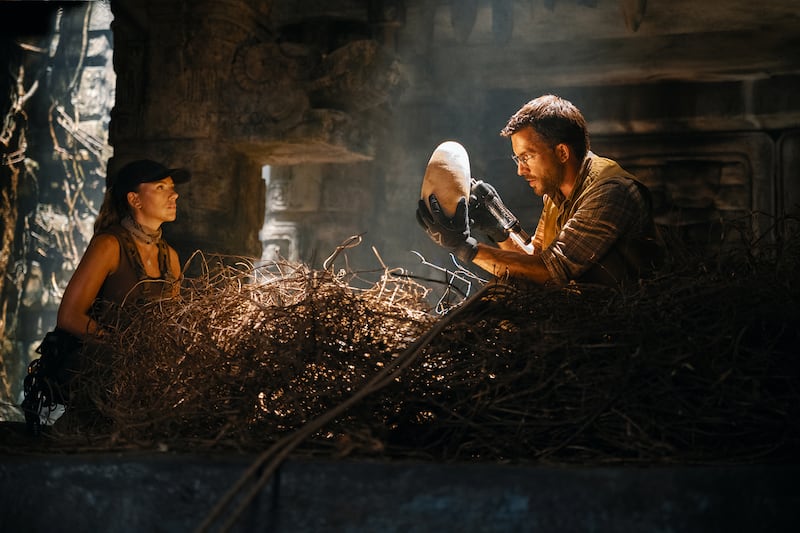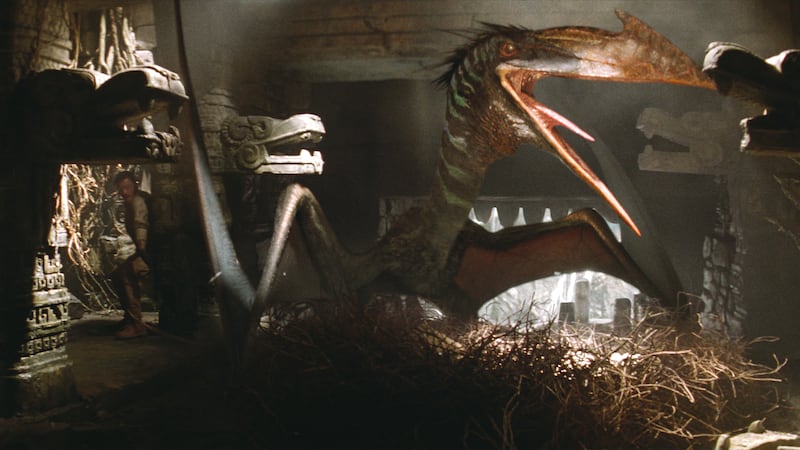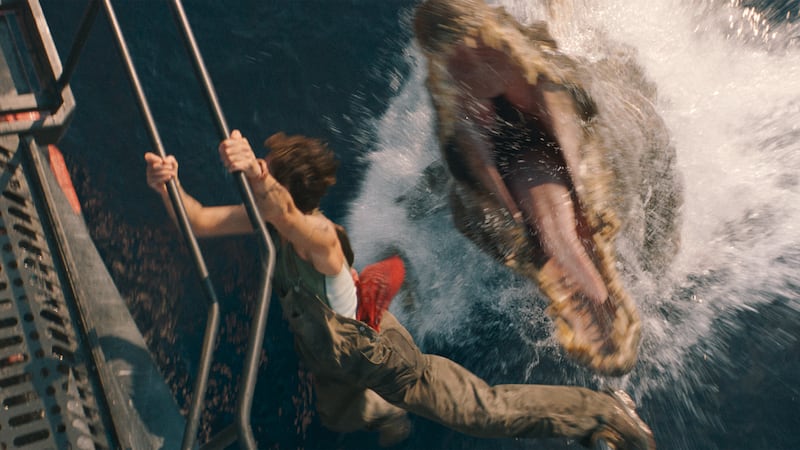The original Jurassic Park was a cautionary tale about man’s insatiable greed and hubristic desire to control nature. Its numerous follow-ups—each focused on humans traveling to remote areas populated by the planet’s resurrected prehistoric ancestors—have reiterated that point to diminishing returns.
Having grossed more than $6 billion at the global box office, the lucrative franchise is about, and driven by, a profit motive, and Jurassic World Rebirth, in theaters July 2, doesn’t alter that fundamental code, following a new group of avaricious adventurers as they put themselves in dino-harm’s way for financial gain. The underwhelming result is similar to its signature beasts: a handsome clone that serves no purpose except to line its creators’ pockets.
Gareth Edwards’ creature-feature bona fides (Monsters, Godzilla) make him an ideal director to helm this seventh installment, and though he’s incapable of generating a sense of awe—at this stage in the series’ lifespan, majestic panoramas of behemoths roaming wide-open fields have become hackneyed cinematic sights—he proficiently handles his suspenseful set pieces.
Jurassic World Rebirth concocts a couple of novel ways to put its protagonists in monstrous peril, pitting them against fearsome predators who rule the ocean, the air, and the land. Be it a showdown with a colossal aquatic marauder that has a gift for capsizing boats in its vicinity, or a death-defying showdown between aerial killers and a collection of men and women rappelling down a steep cliff face, the film delivers where it most counts, providing the excitement its larger-than-life premise demands.

That peaks with a clash between a family in an inflatable raft whose trip down roaring rapids is spurred by the appearance of the king of the Jurassic Park universe, the Tyrannosaurus Rex. While that baddie is by now a familiar big-screen brute, Edwards orchestrates the sequence with enough up-close-and-personal terror (and a bit of nerve-wracking humor) to get one’s blood pumping.
The director has a genuine fondness for mythic titans and a gift for visually framing them in mist and shadow, and it serves him well in Jurassic World Rebirth, whose finest moments are those in which the dinosaurs tower over their lush habitats and pint-sized prey, with beauty and horror naturally and breathtakingly commingling.
Unfortunately, such instances are sporadic in this latest saga, whose story takes place in a present-day in which dinosaurs have lost their museum-attraction appeal and mainly function as traffic jam-creating nuisances for urban commuters. Because they’re not fit for most climates, they’re also dying off, save for in a few regions near the equator that have been designated off-limits by global governments.
It’s to one of these islands that Big Pharma bigwig Martin Krebs (Rupert Friend) wants to visit in order to retrieve biological material he believes is the key to curing heart disease. As explained by paleontologist Dr. Henry Loomis (Jonathan Bailey), samples from three of the biggest living dinosaurs is necessary to make this research project a life-saving triumph, and Krebs thus hires mercenary Zora Bennett (Scarlett Johansson) to get what he needs for the nice round sum of $10 million.

Zora accepts this borderline-suicidal assignment because she covets cash, and that goes likewise for her buddy, boatman Duncan Kincaid (Mahershala Ali), thereby casting Jurassic World Rebirth as another sequel in which the quest for more money begets more problems. No sooner have they begun their voyage on the high seas than they’re sidetracked by a mayday call by Reuben Delgado (Manuel Garcia-Rulfo), whose sailboat has been wrecked by a whale-y dino, stranding him in the middle of the Atlantic with his daughters Teresa (Luna Blaise) and Isabella (Audrina Miranda) as well as Teresa’s jerky boyfriend Xavier (David Iacono).
These characters are completely superfluous to the plot, and yet screenwriter David Koepp (returning to the Jurassic Park fold after scripting the first two Spielberg entries) expends as much energy on them as he does on Zora and her mates—a fatal mistake considering they’re one-dimensional nobodies played by actors considerably less magnetic than their A-list counterparts.

That said, Jurassic World Rebirth is totally devoid of personality, with Johansson stuck playing a thinly sketched covert operative whose self-interest quickly and jarringly gives way to altruism, and the Oscar-winning Ali saddled with a featureless role that’s far beneath his talents and mostly consigns him to the background. Friend and Bailey aren’t served much better by the film: the former’s Martin is a typical sort of profiteering cretin and the latter’s Henry is a virtuous nerd whom the proceedings try, and fail, to suggest shares a flicker of romantic chemistry with Zora.
Together, these ciphers trek through thick jungles, waist-high grassy plains, murky streams, and abandoned scientific facilities, and at no juncture along their journey do they say or do anything that remotely registers as interesting, much less funny or charming.
Jurassic World Rebirth indulges in Jurassic World’s silly dinosaurs-as-friendly-pets angle as well as repeats its upping-the-ante gimmick by revealing that the island upon which its heroes have landed is full of mutant beasts created via cross-breeding—including one that appears to share DNA with the alien that burst out of John Hurt’s chest back in 1979.
That mega-ultra-goliath is meant to be this harrowing tale’s pièce de résistance, but there’s something dispiritingly underwhelming about it, especially when juxtaposed with the eternally formidable and ferocious T-Rex. In an effort to outdo its predecessors in terms of scale and menace, the film resorts to fantastical make-believe that seems better suited for a Godzilla or King Kong MonsterVerse spectacular.

More than 30 years after Spielberg’s blockbuster ushered in an age of dino-extravaganzas (and CGI magic), Jurassic World Rebirth proves incapable of doing more than simply following in its forefather’s well-worn footsteps. Edwards’ expert choreography of primeval mayhem is enough to imply that the franchise isn’t quite on the precipice of extinction; no matter how many times one has seen them, visions of puny, foolhardy explorers and exploiters attempting to evade immense creatures remains a pleasurable summertime thrill.
Nonetheless, the laziness that defines every non-action-oriented aspect of this affair is a stark reminder that while the prehistoric giants may be the stars of the show, their appeal is limited when pitted against insipid characters designed as merely mild, discount dino-chow.
The post ‘Jurassic World Rebirth’ Makes the Case for These Cinema Dinos to Be Extinct appeared first on The Daily Beast.




